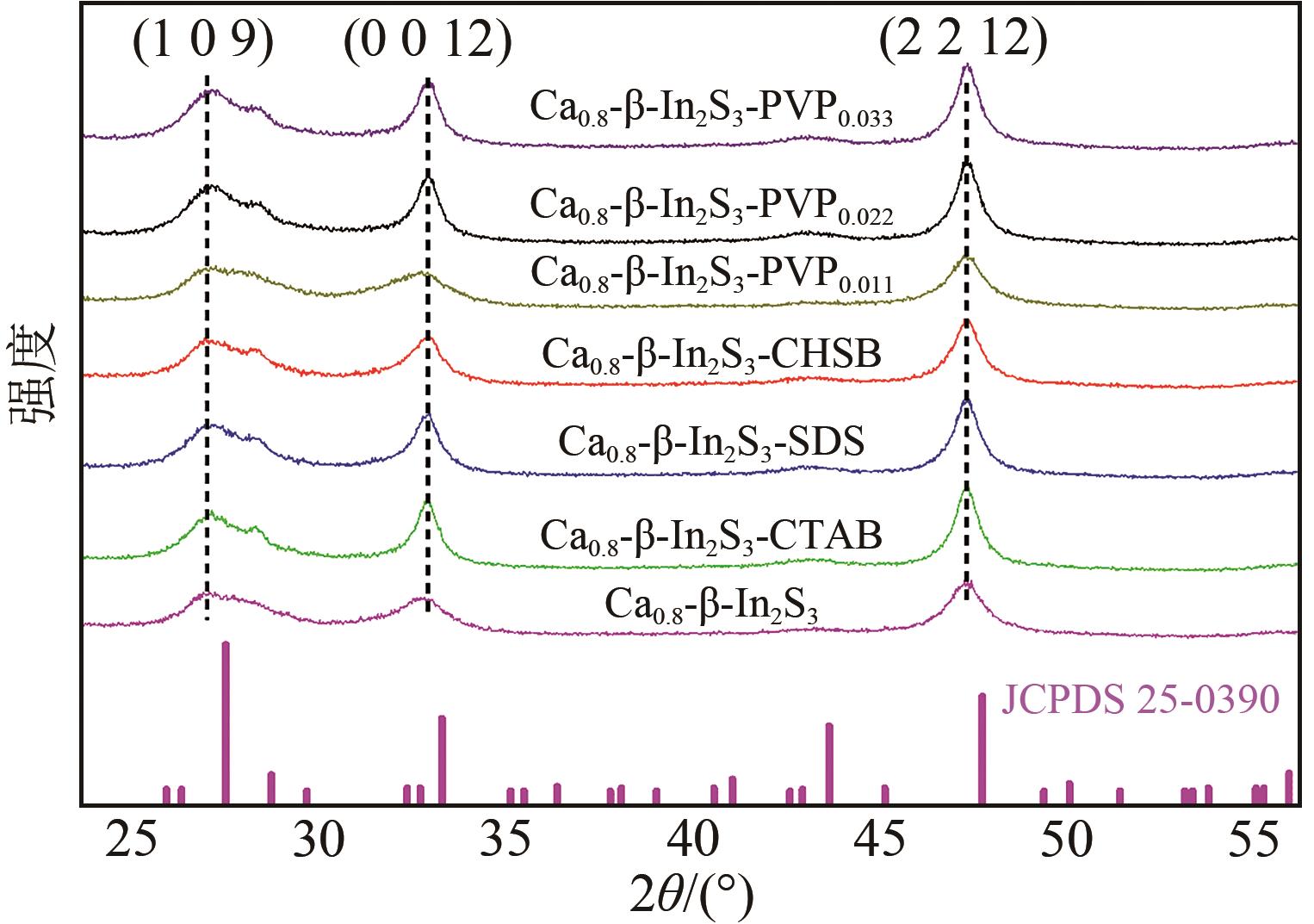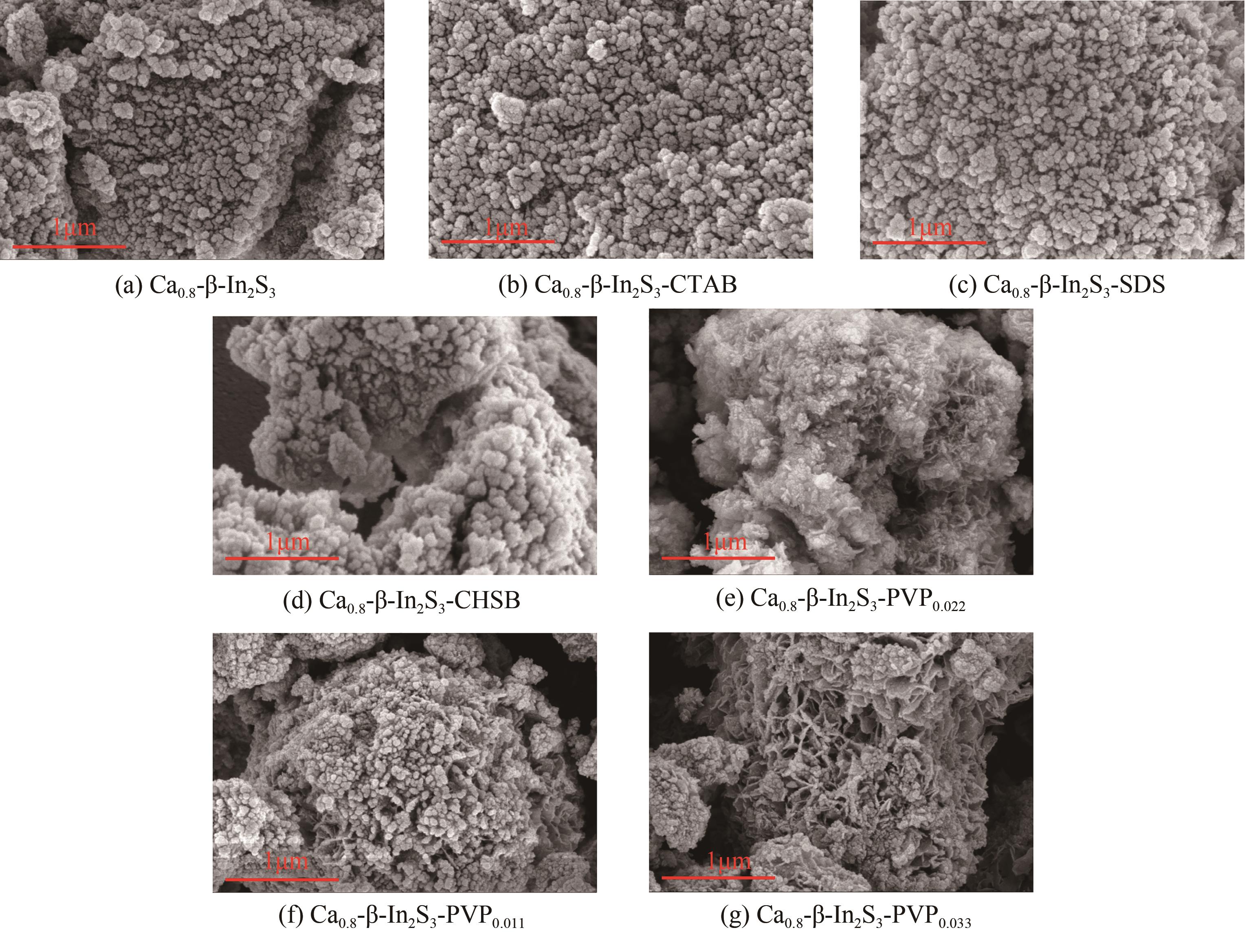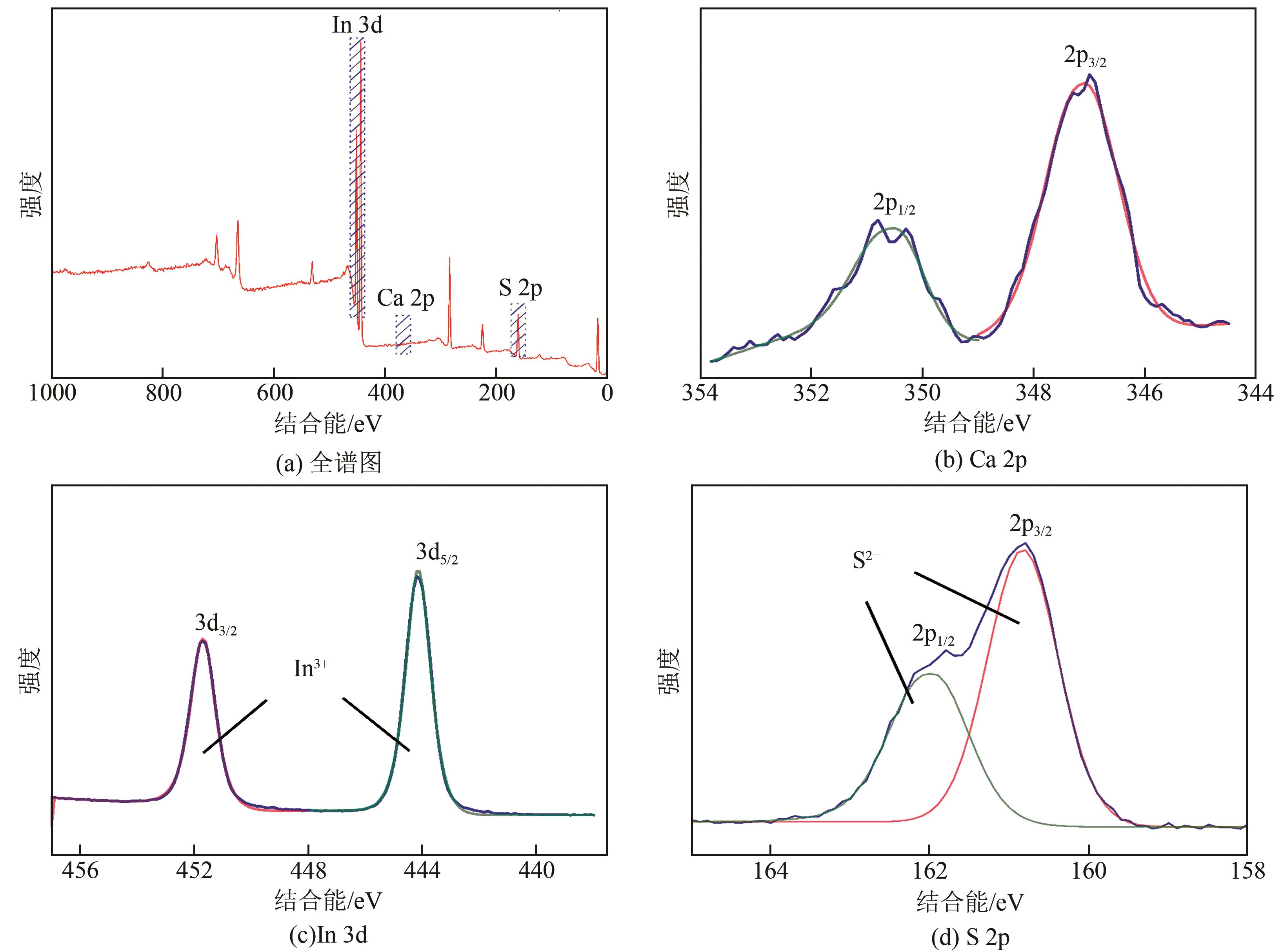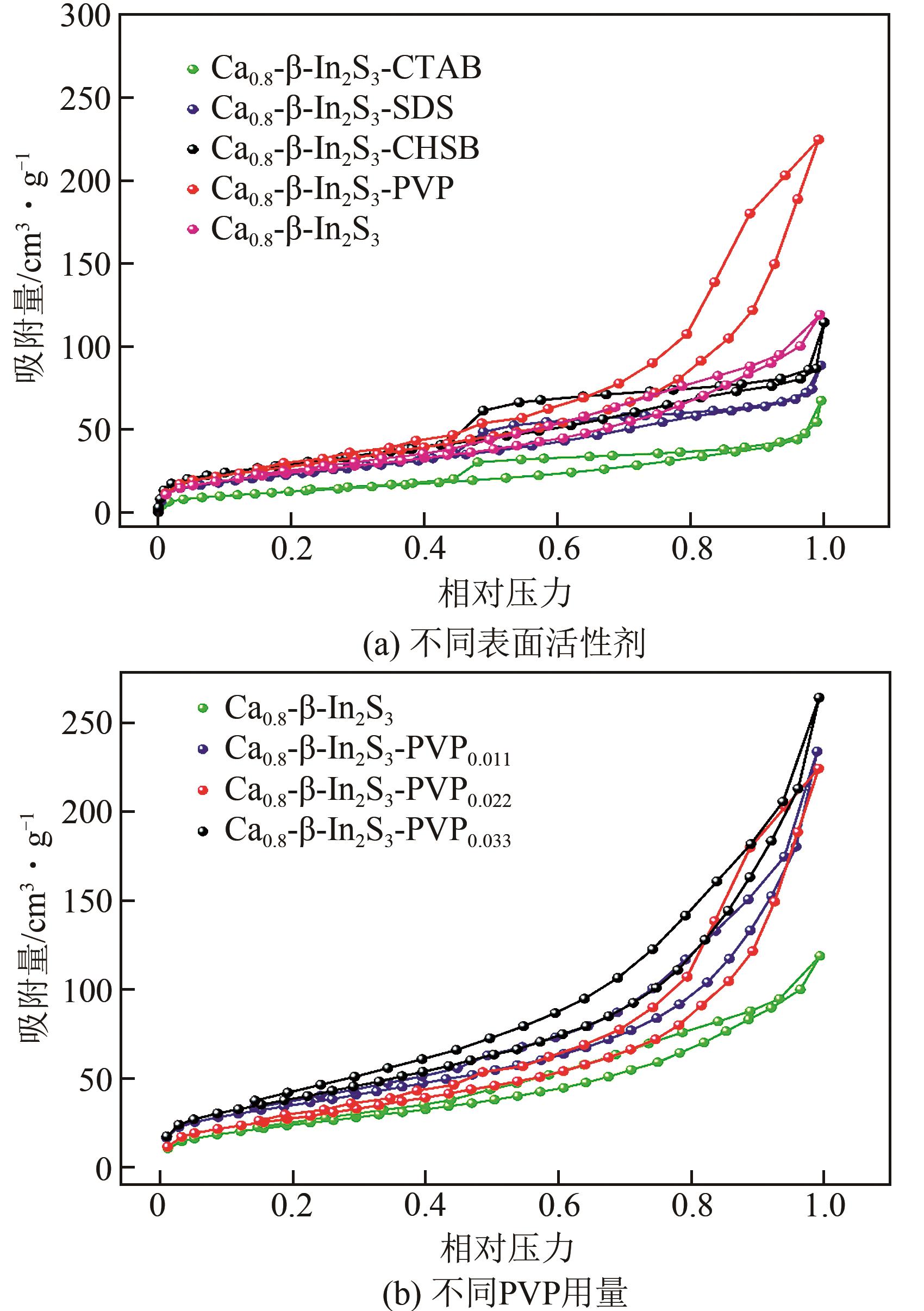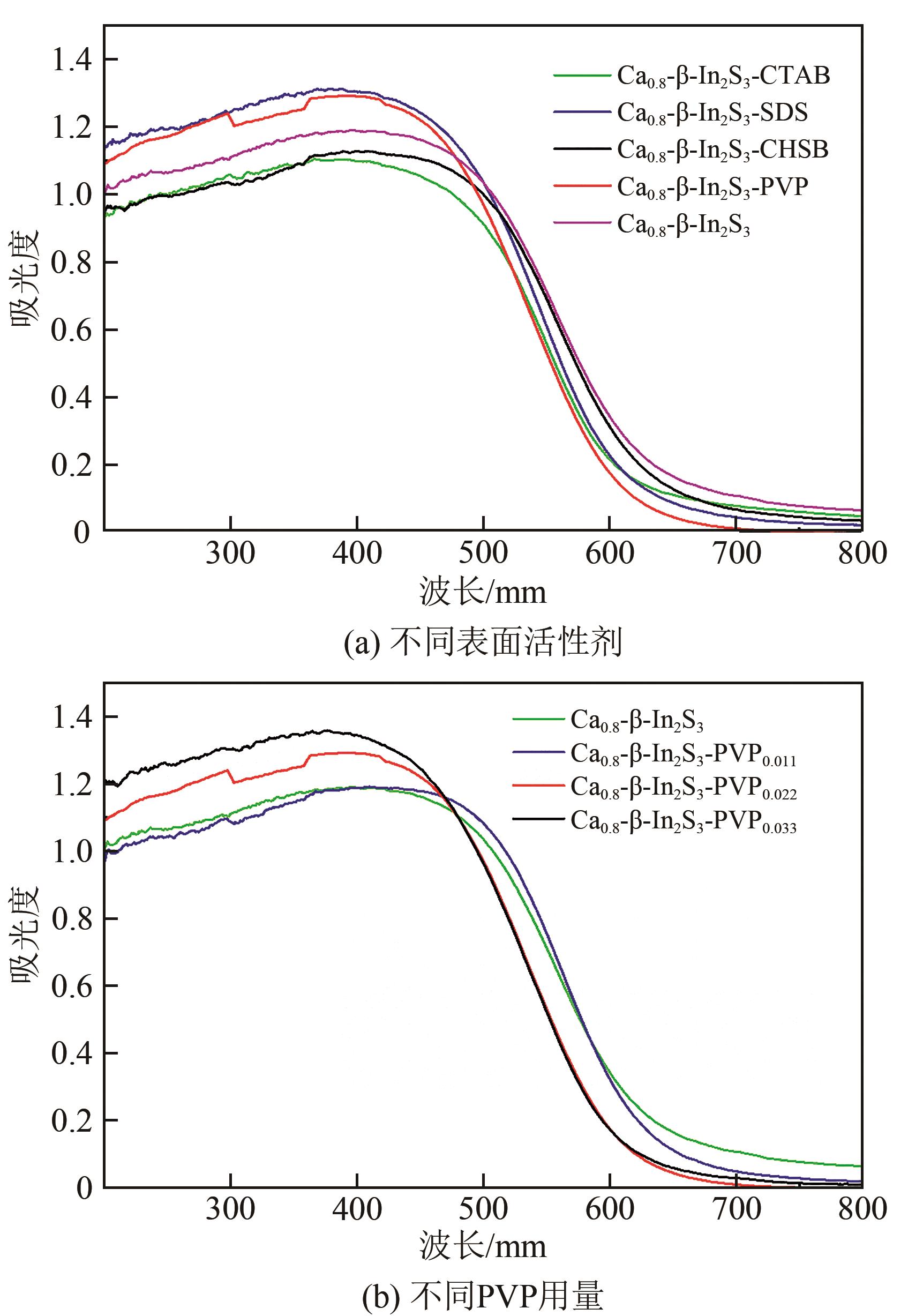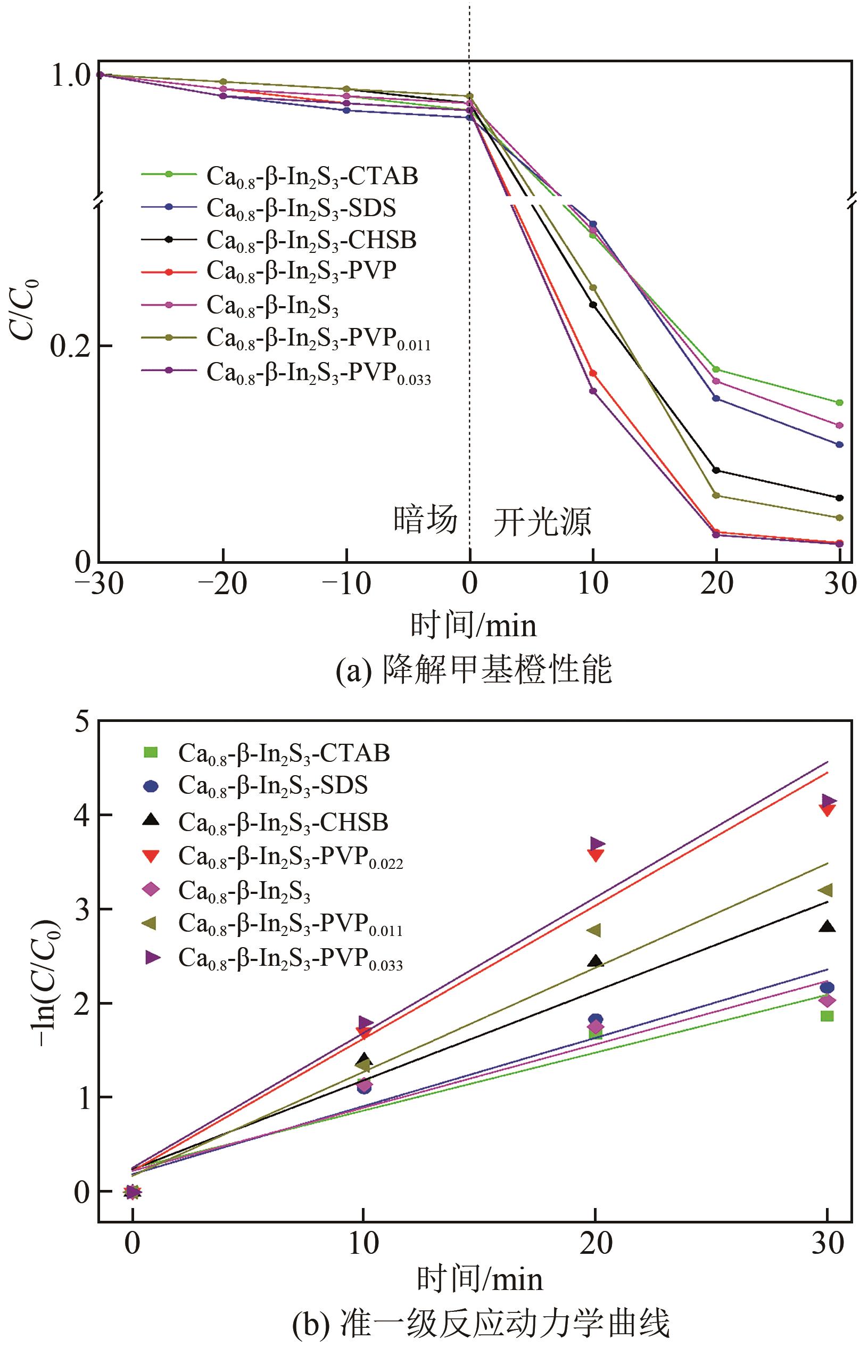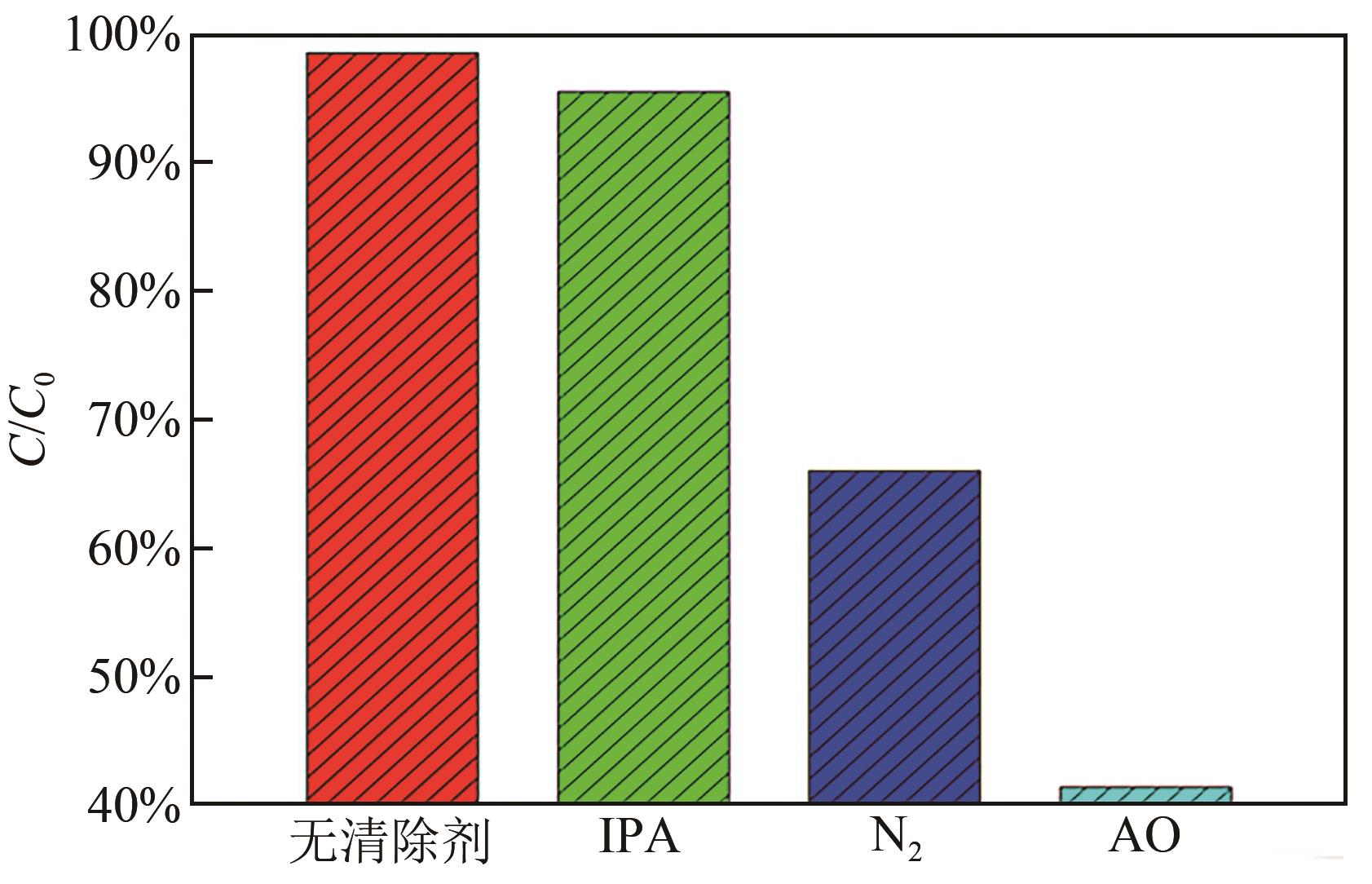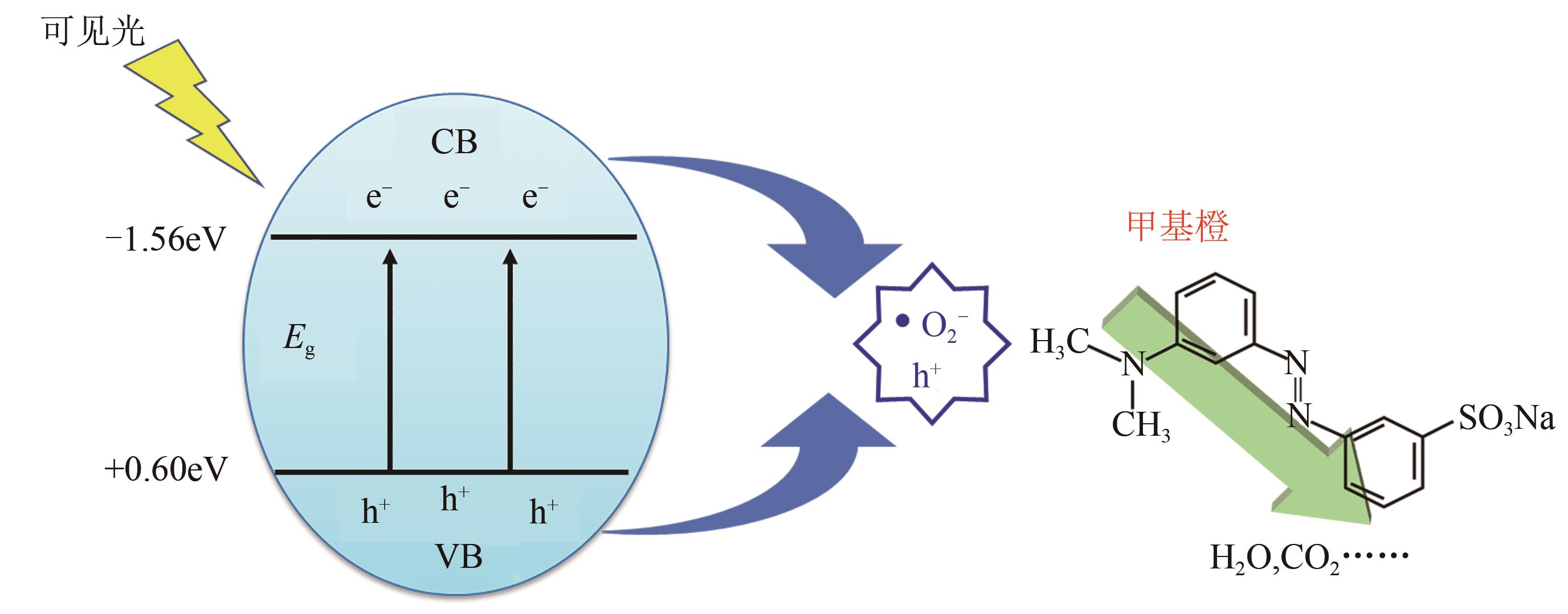Chemical Industry and Engineering Progress ›› 2023, Vol. 42 ›› Issue (2): 774-782.DOI: 10.16085/j.issn.1000-6613.2022-0632
• Industrial catalysis • Previous Articles Next Articles
Effect of surfactant on the preparation of Ca-doped β-In2S3 microstructure and its performance in photocatalytic degradation of methyl orange
YAO Wen( ), ZHANG Yuchen, TENG Wenxin, LI Jiangling(
), ZHANG Yuchen, TENG Wenxin, LI Jiangling( )
)
- College of Materials Science and Engineering, Chongqing University, Chongqing 400044, China
-
Received:2022-04-12Revised:2022-06-20Online:2023-03-13Published:2023-02-25 -
Contact:LI Jiangling
表面活性剂对制备Ca掺杂β-In2S3微观结构的影响及其光催化降解甲基橙性能
- 重庆大学材料科学与工程学院,重庆 400044
-
通讯作者:黎江玲 -
作者简介:姚稳(1996—),男,硕士研究生,研究方向为光催化剂。E-mail:544975793@qq.com。 -
基金资助:国家自然科学基金面上项目(51974049)
CLC Number:
Cite this article
YAO Wen, ZHANG Yuchen, TENG Wenxin, LI Jiangling. Effect of surfactant on the preparation of Ca-doped β-In2S3 microstructure and its performance in photocatalytic degradation of methyl orange[J]. Chemical Industry and Engineering Progress, 2023, 42(2): 774-782.
姚稳, 张雨晨, 滕文馨, 黎江玲. 表面活性剂对制备Ca掺杂β-In2S3微观结构的影响及其光催化降解甲基橙性能[J]. 化工进展, 2023, 42(2): 774-782.
share this article
Add to citation manager EndNote|Ris|BibTeX
URL: https://hgjz.cip.com.cn/EN/10.16085/j.issn.1000-6613.2022-0632
| 样品 | 比表面积/m2·g-1 | 总孔容/cm3·g-1 | 平均孔径/nm |
|---|---|---|---|
| Ca0.8-β-In2S3 | 72.194 | 0.114 | 4.396 |
| Ca0.8-β-In2S3-CTAB | 47.864 | 0.087 | 7.298 |
| Ca0.8-β-In2S3-SDS | 88.003 | 0.128 | 5.831 |
| Ca0.8-β-In2S3-CHSB | 109.370 | 0.141 | 5.169 |
| Ca0.8-β-In2S3-PVP0.011 | 128.080 | 0.377 | 3.718 |
| Ca0.8-β-In2S3-PVP0.022 | 145.679 | 0.390 | 3.813 |
| Ca0.8-β-In2S3-PVP0.033 | 146.369 | 0.398 | 3.851 |
| 样品 | 比表面积/m2·g-1 | 总孔容/cm3·g-1 | 平均孔径/nm |
|---|---|---|---|
| Ca0.8-β-In2S3 | 72.194 | 0.114 | 4.396 |
| Ca0.8-β-In2S3-CTAB | 47.864 | 0.087 | 7.298 |
| Ca0.8-β-In2S3-SDS | 88.003 | 0.128 | 5.831 |
| Ca0.8-β-In2S3-CHSB | 109.370 | 0.141 | 5.169 |
| Ca0.8-β-In2S3-PVP0.011 | 128.080 | 0.377 | 3.718 |
| Ca0.8-β-In2S3-PVP0.022 | 145.679 | 0.390 | 3.813 |
| Ca0.8-β-In2S3-PVP0.033 | 146.369 | 0.398 | 3.851 |
| 1 | 陈厚望, 刘宏, 张鹏, 等. Ag3PO4/AgI光催化剂的制备及降解2-氨基-4-乙酰氨基苯甲醚机理[J]. 化工进展, 2021, 40(8): 4268-4277. |
| CHEN Houwang, LIU Hong, ZHANG Peng, et al. Preparation of Ag3PO4/AgI photocatalyst and its mechanism of AMA degradation[J]. Chemical Industry and Engineering Progress, 2021, 40(8): 4268-4277. | |
| 2 | 张英芳, 董清溪, 马春, 等. Co3O4-Bi2O2CO3催化剂的制备及其光催化性能[J]. 化工进展, 2021, 40(S1): 238-244. |
| ZHANG Yingfang, DONG Qingxi, MA Chun, et al. Preparation and photocatalytic properties of Co3O4-Bi2O2CO3 catalyst[J]. Chemical Industry and Engineering Progress, 2021, 40(S1): 238-244. | |
| 3 | AI Cuiling, ZHOU Dandan, WANG Qian, et al. Optimization of operating parameters for photocatalytic degradation of tetracycline using In2S3 under natural solar radiation[J]. Solar Energy, 2015, 113: 34-42. |
| 4 | 水博阳, 宋小三, 范文江. 光催化技术在水处理中的研究进展及挑战[J]. 化工进展, 2021, 40(S2): 356-363. |
| SHUI Boyang, SONG Xiaosan, FAN Wenjiang. Research progress and challenges of photocatalytic technology in water treatment[J]. Chemical Industry and Engineering Progress, 2021, 40(S2): 356-363. | |
| 5 | ASILTÜRK M, SAYıLKAN F, ARPAÇ E. Effect of Fe3+ ion doping to TiO2 on the photocatalytic degradation of Malachite Green dye under UV and vis-irradiation[J]. Journal of Photochemistry and Photobiology A: Chemistry, 2009, 203(1): 64-71. |
| 6 | SINGH J, SONI R K. Controlled synthesis of CuO decorated defect enriched ZnO nanoflakes for improved sunlight-induced photocatalytic degradation of organic pollutants[J]. Applied Surface Science, 2020, 521: 146420. |
| 7 | CHEN Yangfan, DUAN Xu, LI Jiangling, et al. Hydrothermal synthesis of Ca doped β-In2S3 for effective dyes degradation[J]. Advanced Powder Technology, 2021, 32(6): 1881-1890. |
| 8 | WANG L G, XIA L, WU Y J, et al. Zr-doped β-In2S3 ultrathin nanoflakes as photoanodes: Enhanced visible-light-driven photoelectrochemical water splitting[J]. ACS Sustainable Chemistry & Engineering, 2016, 4(5): 2606-2614. |
| 9 | JAYAKRISHNAN R, JOHN T T, KARTHA C S, et al. Do the grain boundaries of β-In2S3 thin films have a role in sub-band-gap photosensitivity to 632.8nm?[J]. Journal of Applied Physics, 2008, 103(5): 053106. |
| 10 | SINGH J, SONI R K. Fabrication of nanostructured In2S3 thin film with broad optical absorption for improved sunlight mediated photocatalysis application[J]. Optical Materials, 2021, 122: 111748. |
| 11 | AN Xiaoqiang, YU J C, WANG Feng, et al. One-pot synthesis of In2S3 nanosheets/graphene composites with enhanced visible-light photocatalytic activity[J]. Applied Catalysis B: Environmental, 2013, 129: 80-88. |
| 12 | FENG Jinna, YANG Zhiquan, HE Shan, et al. Photocatalytic reduction of Uranium(Ⅵ) under visible light with Sn-doped In2S3 microspheres[J]. Chemosphere, 2018, 212: 114-123. |
| 13 | LIN Lingyan, YU Jinling, CHENG Shuying, et al. Influence of Ag and Sn incorporation in In2S3 thin films[J]. Chinese Physics B, 2015, 24(7): 078103. |
| 14 | YANG Shuang, XU Chengyan, ZHANG Baoyou, et al. Ca(Ⅱ) doped β-In2S3 hierarchical structures for photocatalytic hydrogen generation and organic dye degradation under visible light irradiation[J]. Journal of Colloid and Interface Science, 2017, 491: 230-237. |
| 15 | GHOSH S, SAHA M, ASHOK V D, et al. Excitation dependent multicolor emission and photoconductivity of Mn, Cu doped In2S3 monodisperse quantum dots[J]. Nanotechnology, 2016, 27(15): 155708. |
| 16 | SINGH VIG A, RANI N, GUPTA A, et al. Influence of Ca-doped NaNbO3 and its heterojunction with g-C3N4 on the photoredox performance[J]. Solar Energy, 2019, 185: 469-479. |
| 17 | YAO Wen, CHEN Yangfan, LI Jiangling, et al. Photocatalytic degradation of methyl orange by Ca doped β-In2S3 with varying Ca concentration[J]. Research on Chemical Intermediates, 2022, 48(5): 1813-1829. |
| 18 | LIANG Qinghua, LIU Xiaojuan, ZENG Guangming, et al. Surfactant-assisted synthesis of photocatalysts: Mechanism, synthesis, recent advances and environmental application[J]. Chemical Engineering Journal, 2019, 372: 429-451. |
| 19 | 韩晓雪. 纳米TiO2表面性质和表面活性剂对纳米流体物性的影响[D]. 北京: 华北电力大学(北京), 2019. |
| HAN Xiaoxue. Effects of the surface properties of nano-TiO2 and surfactants on the physical properties of nanofluids[D]. Beijing: North China Electric Power University, 2019. | |
| 20 | WANG Mi, GAO Yanfeng, DAI Lei, et al. Influence of surfactants on the morphology of SnO2 nanocrystals prepared via a hydrothermal method[J]. Journal of Solid State Chemistry, 2012, 189: 49-56. |
| 21 | SHEN Shaohua, ZHAO Liang, GUO Liejin. Crystallite, optical and photocatalytic properties of visible-light-driven ZnIn2S4 photocatalysts synthesized via a surfactant-assisted hydrothermal method[J]. Materials Research Bulletin, 2009, 44(1): 100-105. |
| 22 | YAKOUT S M, EL-SAYED A M. Enhanced ferromagnetic and photocatalytic properties in Mn or Fe doped p-CuO/n-ZnO nanocomposites[J]. Advanced Powder Technology, 2019, 30(11): 2841-2850. |
| 23 | ZHANG Shenpeng, SONG Xuezhi, LIU Sihang, et al. Template-assisted synthesized MoS2/polyaniline hollow microsphere electrode for high performance supercapacitors[J]. Electrochimica Acta, 2019, 312: 1-10. |
| 24 | FAUZI A A, JALIL A A, HASSAN N S, et al. A critical review on relationship of CeO2-based photocatalyst towards mechanistic degradation of organic pollutant[J]. Chemosphere, 2022, 286: 131651. |
| 25 | DU Weimin, ZHU Jun, LI Shixiong, et al. Ultrathin β-In2S3 nanobelts: Shape-controlled synthesis and optical and photocatalytic properties[J]. Crystal Growth & Design, 2008, 8(7): 2130-2136. |
| 26 | GUO Sheng, WANG Haojie, YANG Wei, et al. Scalable synthesis of Ca-doped α-Fe2O3 with abundant oxygen vacancies for enhanced degradation of organic pollutants through peroxymonosulfate activation[J]. Applied Catalysis B: Environmental, 2020, 262: 118250. |
| 27 | ZHOU Min, XIE Xialin, LIU Qianyan, et al. Spherical In2S3 anchored on g-C3N4 nanosheets for efficient elemental mercury removal in the wide temperature range[J]. Chemical Engineering Journal, 2022, 430: 132857. |
| 28 | MOTAUNG M P, ONWUDIWE D C, WEI L, et al. CuS, In2S3 and CuInS2 nanoparticles by microwave-assisted solvothermal route and their electrochemical studies[J]. Journal of Physics and Chemistry of Solids, 2022, 160: 110319. |
| 29 | GAO Wenwen, LIU Wenxia, LENG Yanhua, et al. In2S3 nanomaterial as a broadband spectrum photocatalyst to display significant activity[J]. Applied Catalysis B: Environmental, 2015, 176/177: 83-90. |
| 30 | GHOSH U, PAL A. Graphitic carbon nitride based Z scheme photocatalysts: Design considerations, synthesis, characterization and applications[J]. Journal of Industrial and Engineering Chemistry, 2019, 79: 383-408. |
| 31 | TANG Juntao, WANG Jianlong. Fe-based metal organic framework/graphene oxide composite as an efficient catalyst for Fenton-like degradation of methyl orange[J]. RSC Advances, 2017, 7(80): 50829-50837. |
| [1] | ZHAO Jingchao, TAN Ming. Effect of surfactants on the reduction of industrial saline wastewater by electrodialysis [J]. Chemical Industry and Engineering Progress, 2023, 42(S1): 529-535. |
| [2] | WANG Jinhang, HE Yong, SHI Lingli, LONG Zhen, LIANG Deqing. Progress of gas hydrate anti-agglomerants [J]. Chemical Industry and Engineering Progress, 2023, 42(9): 4587-4602. |
| [3] | WANG Chen, BAI Haoliang, KANG Xue. Performance study of high power UV-LED heat dissipation and nano-TiO2 photocatalytic acid red 26 coupling system [J]. Chemical Industry and Engineering Progress, 2023, 42(9): 4905-4916. |
| [4] | HUANG Yufei, LI Ziyi, HUANG Yangqiang, JIN Bo, LUO Xiao, LIANG Zhiwu. Research progress on catalysts for photocatalytic CO2 and CH4 reforming [J]. Chemical Industry and Engineering Progress, 2023, 42(8): 4247-4263. |
| [5] | GUO Lixing, PANG Weiying, MA Keyao, YANG Jiahan, SUN Zehui, ZHANG Pan, FU Dong, ZHAO Kun. Hierarchically multilayered TiO2 with spatial pore-structure for efficient photocatalytic CO2 reduction [J]. Chemical Industry and Engineering Progress, 2023, 42(7): 3643-3651. |
| [6] | XU Wei, LI Kaijun, SONG Linye, ZHANG Xinghui, YAO Shunhua. Research progress of photocatalysis and co-electrochemical degradation of VOCs [J]. Chemical Industry and Engineering Progress, 2023, 42(7): 3520-3531. |
| [7] | YANG Yang, SUN Zhigao, LI Cuimin, LI Juan, HUANG Haifeng. Promotion on the formation of HCFC-141b hydrate under static conditions by surfactant OP-13 [J]. Chemical Industry and Engineering Progress, 2023, 42(6): 2854-2859. |
| [8] | ZHANG Ning, WU Haibin, LI Yu, LI Jianfeng, CHENG Fangqin. Recent advances in preparation and application of floating photocatalysts in water treatment [J]. Chemical Industry and Engineering Progress, 2023, 42(5): 2475-2485. |
| [9] | YANG Zhuang, LI Runhua, QIANG Zengshou, WANG Yajun, YAO Wenqing. Photocatalytic degradation of waste refrigerant R134a [J]. Chemical Industry and Engineering Progress, 2023, 42(4): 2109-2114. |
| [10] | GAO Tingting, JIANG Zhen, WU Xiaoyi, HAO Tingting, MA Xuehu, WEN Rongfu. Experimental investigation on lithium-ion battery heat dissipation performance of oscillating heat pipe with micro-nano emulsion [J]. Chemical Industry and Engineering Progress, 2023, 42(3): 1167-1177. |
| [11] | DUO Jia, YAO Guodong, WANG Yingji, ZENG Xu, JIN Binbin. Effects on the photo-degradation of norfloxacin using modified Au-TiO2 [J]. Chemical Industry and Engineering Progress, 2023, 42(2): 624-630. |
| [12] | CHENG Rong, DENG Ziqi, XIA Jincheng, LI Jiang, SHI Lei, ZHENG Xiang. Research progress on photocatalysis systems for inactivation of microbial aerosol [J]. Chemical Industry and Engineering Progress, 2023, 42(2): 957-968. |
| [13] | BI Qiang, MEI Yi, XIA Jupei. Basic research on preparation and activity combined excitation of anhydrite-Ⅱ phosphogypsum [J]. Chemical Industry and Engineering Progress, 2023, 42(10): 5427-5435. |
| [14] | DENG Quanlong, DING Houcheng, XU Yuandi, JIANG Zhong’an, YANG Lan, SUN Xuefei. Synergistic dust removal performance of surfactant droplets combined with metal mesh grid [J]. Chemical Industry and Engineering Progress, 2023, 42(1): 546-552. |
| [15] | KOU Jiawei, CHENG Shuyan, CHENG Fangqin. Research advance of hydrotalcite-based catalysts in photocatalytic reduction of carbon dioxide [J]. Chemical Industry and Engineering Progress, 2022, 41(S1): 190-198. |
| Viewed | ||||||
|
Full text |
|
|||||
|
Abstract |
|
|||||
